 | Vol. 1 No. 1 2001 |
RE-READING EMERITA QUITO'S THOUGHTS
CONCERNING THE UNDERDEVELOPMENT
OF FILIPINO PHILOSOPHY
F.P.A. Demeterio III
A national culture is the whole body of efforts made by a people in the sphere of thought to describe, justify, and praise the action through which that people has created itself and keeps itself in existence. - Frantz Fanon, The Wretched of the Earth. |
| PRELIMINARY REMARKS |
Romualdo Abulad, in his essay Contemporary Filipino Philosophy, schematized the evolution of Filipino Philosophy into four phases: 1) the first colonial phase, which is characterized by the unchallenged predominance of Thomistic philosophy; 2) the second colonial phase, which is characterized by the influx of contemporary philosophical theories brought home by western-trained Filipino academicians; 3) the phase of early indigenization, which is characterized by the Filipino academicians' concern over the existence and progress of Filipino philosophy, and the quest for a Filipino philosophy, so to say; and 4) the beginnings of the late indigenization, which is characterized by Filipino academicians' distantiation from the agenda of the early phase of indigenization. The main reason, why I selected Professor Doctor Emerita Quito as the subject of my investigation into the problems of Filipino philosophy is that she is one of the very few respectable Filipino philosophers who reflectively witnessed, and actively participated through, the evolution of Filipino philosophy as schematized by Abulad. Graphically, the chart below demonstrates my point.
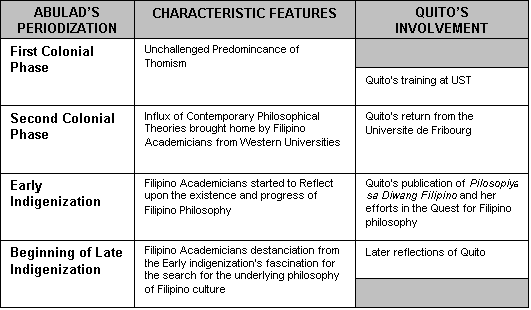
My secondary reasons for selecting her as the subject are: first, she is one of the very few Filipino philosophers who problematized the underdevelopment or the absence of Filipino philosophy; and second, she is definitely one of the greatest philosophy professors, if not philosophers, this country has ever produced. Consequently, her thoughts concerning the underdevelopment of Filipino philosophy are not only intellectually reliable, but historically significant as well. Thus, a systematic critique of her thoughts can offer us a promising pathway towards a re-investigation of the problems of Filipino philosophy.
The problem that this paper is going to address is how come that after almost two decades since Quito laid down her reasons why there is no Filipino philosophy, an authentically Filipino philosophy still has not emerged? In almost two decades' time, many things have changed, the reasons that Quito cited are now mostly rectified, but why is it that the authentically Filipino philosophy is still nowhere to be seen? To address this problem, we have to do four things: 1) first, to re-read Quito's thoughts concerning the underdevelopment of Filipino philosophy; 2) second, to subject her thoughts to a point by point critique; 3) third, to investigate further into the grounds that Quito failed to touch; and 4) fourth, to propose a non-defeatist, realistic and concrete program of action that can hopefully catalyze the development of an authentic Filipino philosophy. My main contention is that Quito's investigation, like what most pioneering works are, is limited owing to her lack of more critical theories and concepts. Though she failed to cut through the heart of the problem, she opened for us a pathway upon which we, equipped with more contemporary theories and concepts, can venture further. Hopefully with our sharper conceptual tools, we can make deeper incisions on the problem at hand to unveil the more radical ailment of Filipino philosophy. From such a diagnosis, we can propose a non-defeatist, realistic and concrete prognosis.
| QUITO'S DIAGNOSIS |
Quito is a very prolific writer, and her speculations concerning the underdevelopment of Filipino philosophy are scattered throughout a number of her works. I am going to concentrate on three of her writings, the 1982 monograph entitled Teaching and Research of Philosophy in the Philippines, the 1983 monograph entitled The State of Philosophy in the Philippines, and the 1983 encyclopedia article entitled Pilosopiyang Filipino. Her scattered speculations are not very sustained nor highly organized. For the sake of this presentation, I took liberty, therefore in re-organizing them under four headings, namely: 1) the historical problem, 2) the economic and institutional problems, 3) the linguistic problems, and 4) the cultural problem.
| The Historical Problem |
Though Quito got her basic training at the University of Santo Tomas, and for some time taught at this renowned Thomistic enclave, she has very noticeable sentiments against Thomism. The historical problem that we have mentioned above refers to the fact that philosophy in the Philippines started as a preparatory course for Catholic theology, and as such it is almost exclusively Thomistic.1 Since philosophy is subsumed under the agenda of catholic theology, which in return is subsumed under the agenda of Catholic dogmatism, Thomistic philosophy is not a free philosophy, but a philosophy in bondage. A human person, whose freedom is taken away and who is chained into servitude, cannot be creative nor capable of developing himself anymore. A philosophy that is without its own agenda shares a similar fate with a person in bondage. Abulad's schema is misleading, in the sense that it suggests that the first colonial phase that is predominated by Thomism is a thing of the past. The first colonial phase is still very much with us. In fact, it is still the most predominant mode of doing philosophy in the Philippines. The other three phases in Abulad's schema are just insignificant enclaves of progressive school of thoughts scattered mostly in the metropolis. I fully agree with Quito regarding the significance of this problem.
| The Economic and Institutional Problems |
Having been educated in Europe, Quito personally witnessed the economic, cultural and symbolic benefits accorded by European societies on their philosophers and philosophy professors. Back in the Philippines things appeared very stark. "The number one problem of the profession," she would say later on, "is the paucity of a professor's remuneration. In the Philippine context, academic personnel are among the lowest paid among professionals."2 Bereft of economic rewards, as well as cultural and symbolic prestige the philosophy profession in the country encountered problems in motivating the professors' academic performance, and problems in recruiting the more intelligent students with the right aptitude for philosophy. Aside from these problems in human resources development, Quito stressed that philosophy in the country suffers because of some institutional problems, like lack of research funds, too much teaching assignments given to professors, absence of research policies and absence of systematic professional development program, in particular the opportunity of taking graduate studies abroad.
| The Linguistic Problem |
Even the most under-qualified Filipino academician is multi-lingual, with two languages at least, and if he does not belong to the Tagalog ethno-linguistic block, three languages at least. Yet such a multi-lingual skill is not enough for Quito. She says: "professors who knew no other language than English are greatly handicapped in philosophical research. They depend largely on translations which are most often mere interpretations."3
If there is a problem in the international level, Quito also found another linguistic problem in the national level. "Indigenous Filipino thought is stilted by a foreign language such as English in which the average Filipino expresses himself."4 Consequently, "until the Filipino people recover the native tongue, it will not develop an indigenous philosophy, for the soul of a people is better expressed in a native language."5
| The Cultural Problem |
Quito noticed that culturally speaking, in the Philippines there seems to be a resistance against philosophy. She says:
On the popular or grassroots level, the term 'pilosopo' (Pilipino word for 'philosopher') is a pejorative name for anyone who argues lengthily, whether rightly or wrongly. The term alludes to a character called "Pilosopo Tasyo' (Tasyo, the Philosopher) who perorates endlessly in one of the novels of the Philippines' national hero, Jose Rizal . . . . the term 'pilosopo' has seeped into the academic consciousness with a damaging effect.6 |
For her this is one of the reasons why Filipino philosophy is underdeveloped.
| Quito's Prognosis on Filipino Philosophy |
Though Quito presented a very harrowing picture of the state of philosophy in the Philippines, that is mangled by historical, economic, institutional, linguistic and cultural problems, she is hopeful that Filipino philosophy can overcome these obstacles and barriers. Though her diagnosis is rather gloomy, the prognosis that she presents is brighter. Her idea of the emergence of an authentic Filipino philosophy can be seen in her schematization of philosophy in the Philippines into:
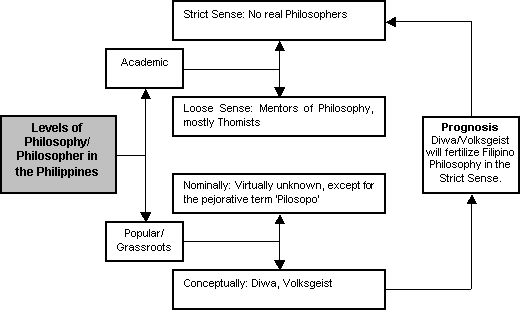
In the academic level, Quito laments the facts that we do not have real philosophers, and that what we are mere expositors of alien theories who are mostly Thomists. In the popular or grassroots level, however, though nominally we have the pejorative term 'pilosopo', we have conceptually speaking a rich heritage of diwang Filipino, or Volksgeist, which is composed of native concepts and schemata. By exploring these local knowledges, she hopes to discover catalysts for the emergence of Filipino philosophy. She says:
This collective mind, this general attitude toward life, this concerted effort to acquire wisdom which is manifest on the popular or grassroots level constitutes the folk spirit (Volksgeist) of the Filipino and it should (or will) eventually emerge as the formalized philosophy on the academic level. This philosophy however, is still in the process of formalization.7 |
Here, she is pushing further the endogenous method of Florentino Timbreza that deploys native concepts and schemata to understand sublime philosophical ideas. As far as this prognosis is concerned, Quito belongs to Abulad's early phase of indigenization.
| CRITIQUE OF QUITO'S DIAGNOSIS |
Basically, the above-mentioned clusters of problems, as well as the hypothesized pathway of emergence, constitute my reading of Quito's thoughts concerning the underdevelopment of Filipino philosophy. The succeeding sections will present my detailed critique of her thoughts.
| On The Historical Problem Problem |
I believe that an ideological enclosure and philosophy are two incompatible things. Once you put philosophy inside an ideological enclosure, the result is either philosophy will break the latter's walls, or these walls will incarcerate and decimate philosophy. Thomas Aquinas, was a free thinker, when situated inside the ideological enclosure of the Catholic dogmatism, he powerfully broke through the latter's walls. After breaking through its walls, however, Catholic dogmatism using Thomas' philosophy rebuilt a larger and stronger ideological enclosure. This bigger and stronger enclosure is the same wall that incarcerates a huge section of philosophy in the Philippines. If we accept the predominant conceptions of many Thomists that this Aquinian wall is so strong and sturdy, which I believe its is, then the implication will be that any philosophy that happens to be incarcerated inside its walls, cannot reasonably survive. I totally agree with Quito that Thomism is a great stumbling block for Filipino philosophy. However, she overlooked that philosophy is a paradigm that can be adopted at one moment and rejected in another moment. This means that if a philosopher finds himself incarcerated inside the Aquinian wall, through which he cannot break free, this does not mean that he cannot breach this wall. In fact, Quito herself did not break through Aquinian wall, she merely breached over it and went out in search for other useful philosophical paradigms. The second colonial phase in Abulad's scheme, was largely induced by the same process of breaching the Aquinian wall. My objection for Quito is: how come that after a number of Filipino academicians have successfully breached the Aquinian wall, there remains no authentic Filipino philosophy?
| On The Economic and Institutional Problems |
Quito's identification of the defective economic and institutional infrastructure of Filipino philosophy as a major obstacle for the development of an authentic Filipino philosophy is perfectly valid. The French post-structuralist Michel Foucault, in his essay Prison Talk, says: "knowledge and power are integrated with one another, and there is no point in dreaming of time when knowledge will cease to depend on power."8 In order to generate legitimate philosophical knowledge, the Philippine philosophical profession as well as its institutions must stand on power which is basically economic in nature, and secondarily cultural and symbolic. I agree with Quito that without these economic and institutional rudiments it is impossible for Filipino philosophy to emerge. However, Quito wrote her critique almost two decades ago, and since then, many things have changed. We already have a number of academic institutions that provide modest living out of the academic profession, that offer handsome research grants and doctoral scholarships abroad, and had promulgated rigorous research policies. How come that after these favorable windfalls there remains no authentic Filipino philosophy?
| On The Linguistic Problems |
I don't agree with Quito that our inability to read German or French is significant enough to hinder the development of Filipino philosophy. My first reason for this stand is that the American and British publishing industries are strong enough to support the needs of Filipino scholars who wish to specialize in any major European philosopher. What we need primarily is a strong book purchasing policies, in order to get the right books in the right quantity. My second reason for this stand is that knowledge of German or French languages must come only after a strong research agenda that genuinely requires working knowledge of such languages. We do not study German, or French or Italian, just for the sake of knowing these languages. Rather we study any of these languages because we want to explore further and master the thoughts of say Friedrich Nietzsche and Jurgen Habermas, or say Emmanuel Levinas and Francois Lyotard, or say Antonio Gramsci and Umberto Eco.
I perfectly agree with Quito's point that the real spirit and experiences of a people can only be expressed fully by the native tongue. However, she failed to realize that this native tongue is a problematic issue in the Philippines. We are talking here of a language of the spirit, which cannot be altered by a mere stroke of congressional legislation. If in legal papers it is clear that Tagalog or Filipino is our national languages, the language of the Cebuano spirit, or Ilocano spirit, or Bikolano spirit, remain Cebuano, Ilocano or Bikolano. Ten years or twenty years from now, the Filipino language might fully evolve into a true language of the Filipino spirit. But at the moment, it is very difficult for many of us who do not belong to the Tagalog ethno-linguistic block to say that Filipino is the language of our spirit. This is the main reason why I cannot deliver this paper in Filipino. The use of a native tongue is the ideal. But in the absence of a real native tongue, we have to settle for an acceptable lingua franca. Besides, if we really insist that our failure to use the Filipino language is a significant barrier to the development of Filipino philosophy, there are already a number of scholars led by Emerita Quito, Roque Ferriols, Florentino Timberza, Manuel Dy, Romualdo Abulad, and Herminia Reyes, who insisted on the use of this language, but how come there remains no authentic Filipino philosophy?
| On The Cultural Problem |
I think Quito's isolation of Pilosopo Tasyo as a cause for the underdevelopment of Filipino philosophy is rather superficial. I would rather argue that Tasyo is not a cause why there is no Filipino philosophy, for he is instead a symptom of the absence of Filipino philosophy. In literary criticism, particularly in the theatrical genre, we have a stock character called a raisonneur, a personage who is emotionally detached from the other characters, and whose function is to advise others, to comment on critique various situations in the fictive world. This is the personage of Tasyo, the sage whose level of consciousness and acumen surpasses that of the young idealistic Crisostomo Ibarra. Ideally speaking Tasyo should have been a real philosopher, but Rizal probably realized that he has no place for a real philosopher in his 19th century Philippine society. If he were to package Tasyo as a legitimate philosopher, then Tasyo would have been a Thomistic friar, and that would totally subvert the unity of his novel, and he would have committed a sacrilege against his country and his enlightened reason. Tasyo, the raisonneur, has to be placed outside the margins of the society, because this society offers no place for him.
| THE RADICAL PROBLEMS OF FILIPINO PHILOSOPHY |
Though Quito failed to cut through the heart of the problem, she opened for us a pathway upon which our autocritique may venture further. Though many scholars have successfully breached the Aquinian wall, I believe that there is something more to the problem of Thomism. Though most of the defective economic and institutional structures are now significantly corrected, I believe there is something more to the economic and institutional problems. Though I am not convinced about the impossibility of a philosophy to emerge independently of a native language, I believe there is something more to the linguistic problem of Filipino philosophy. Though I do not fault Pilosopo Tasyo as a significant cause for a cultural resistance against philosophy, I believe there is something more to such a cultural resistance. From these convictions, I want to push a little further the frontier cleared by Quito. For each problem that I will reveal, I am going to sketch a non-defeatist, concrete and realistic program of action.
| The Historically Distorted Concept of Philosophy |
Quito had been very vocal about the fact that philosophy in the Philippines is a product of a colonial accident. Being a colonial artifact, I suspected that our very concept of philosophy embodies some radical distortions. Such distortions can be easily revealed by a simple structural comparison between what philosophy should be and what philosophy has been in the Philippines. Graphically, this should be the structure of philosophy.
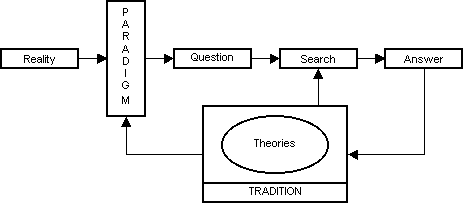
Ideally speaking, philosophy is a paradigmatic (in the Kuhnian sense of the word) reflection on reality that generates questions which calls for a search in order to come up with an answer, and whose answer can be deposited back to tradition to be used in providing further paradigms and research methodologies. The circuit from tradition, to paradigm, to question, to search, to answer, and then back to tradition constitutes the lifeblood of philosophy. Cutting this circuit means killing philosophy. Philosophy in the Philippines, however, had deviated from this ideal structure.
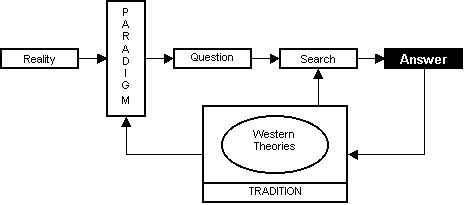
First and foremost, philosophy here in the Philippines is alien in origin. Secondly, it places a fatal emphasis on the answer component of philosophy. Third, it disregards the life-giving circuit from tradition, to paradigm, to question, to search, to answer and back to tradition. Because of such procedure, philosophy before it can ever take root on Philippine soil is already dead. It is like cutting the head of Frantz Fanon, bringing it back to the Philippines and telling everybody "this is Frantz Fanon!" Just as the dead and severed head of Frantz Fanon is not the living Frantz Fanon, the answer component of philosophy is not the whole and living philosophy. If out of six structural components in our diagram, we had been concerned only with just one component, we cannot expect Filipino philosophy to ever live and much less develop on our soil. Furthermore, this way of doing philosophy is not simply alien to Philippine reality, it is indeed alien on five counts: namely alien to our tradition, alien to our paradigms, alien to our questions, alien to our search, and alien to our answers.
This historically distorted concept of philosophy can be most probably traced to the fact that Thomism that transplanted philosophy into our soil, because of its dogmatic undertones, had the same predilection for an undue emphasis on the answer component of philosophy. This predilection, sowed and nurtured by Thomism, I suspect was brought out by our scholars who breach the Aquinian wall. Though these people rejected Thomism, in favor of other philosophical paradigms, they brought with them the residual predilection for a distorting emphasis on the answer component of philosophy at the expense of the other five structural components. This answers the lingering problem how come that after a number of Filipino academicians have successfully breached the Aquinian wall, there remains no authentic Filipino philosophy?
I would not suggest that we go on harping on the colonial accident that is the beginning of philosophy in the Philippines. Rather I would rather suggest a pro-active program of action. Our realization and acceptance of our historically distorted concept of philosophy can already constitute half of the solution. Its fullest solution can happen in the way we holistically conceive, present, and do philosophy that will give due emphasis of all its structural components as well as on its life-giving circuit.
| The Economic and Institutional Practices |
The lingering question left behind by Quito's unveiling of the defects in Filipino philosophy's economic and institutional structure is that how come that after having a number of academic institutions that provide modest living out of the academic profession, that offer handsome research grants and doctoral scholarships abroad, and formulated rigorous research policies, there remains no authentic Filipino philosophy? I would like to re-examine this problem from the perspective of Michel Foucault's thoughts concerning the interrelationship between power and knowledge, or more specifically between the economic and institutional practices as the power base supporting or generating Filipino philosophy as a body of knowledge. Foucault argues that legitimate knowledge cannot emerge from a floating field of utterances alone, for knowledge needs an underlying discursive formation that is composed of heterogenous elements such as objects, instruments, practices, research programs, skills, social network and institution. Though it is beyond question that at least the rudiments of these of a discursive formation are already in existence in at least some of our key universities, the fact remains that a legitimate body knowledge, that is a Filipino philosophy, is still nowhere to be seen. For this situation, Foucault has a convincing answer. He stresses that the heterogenous elements of the discursive formation must interact with each other over a certain stretch of time, before a body of knowledge emerges as a legitimate body of knowledge. An element taken in isolation will certainly not constitute a legitimate body of knowledge. Taking these elements collectively is not a guarantee either that a legitimate body of knowledge will emerge. The crucial thing is that these elements must hum with life through interaction. A research grant given by the Commission on Higher Education, for instance, in itself will not constitute a Filipino philosophy, but if this grant is taken by a Filipino academician and this academician does a philosophical research, publishes his findings in a monograph, and then luckily other academicians and students react to his output and use this as foundation for other researches, then most probably a Filipino philosophy will emerge sooner or later. What I mean is that even though we already have the basic economic and institutional structures, or the rudiments of a discursive formation, their heterogenous elements are still not interacting properly. It is beyond question, that we have enough philosophical utterances. But it is sad to say that these utterances remain scattered, isolated from each other, and hibernating beneath the pages of some philosophical journals or monographs. I believe that Filipino philosophy basically should be a tradition of interrelated and interacting philosophical utterances of Filipino intellectuals, despite the fact that these may be grounded on the most rudimentary discursive formation.
When Quito critiqued the defective economic and institutional infrastructure of Filipino philosophy, the program of action that she had to propose was tremendous. She had to argue that the state, as well as the leading academic institutions, must restructure the defective economic and institutional practices. Now, after almost two decades, our program of action will no longer be hitched on the material component, but on the intellectual and spiritual component of the problem. Since we already have the basic machinery, what we need now is a catalyst that can make the cogs of this machinery hum with life. There is, I believe, no other source of such a catalyst but us, the Filipino professors of philosophy. Through our creative and informed intellectual energy and will power, we can make the cogs of our rudimentary discursive formation turn, and hopefully hum with life. The least we can do is being cognizant about the scattered philosophical utterances of our Filipino pioneers and present them to our students. By encouraging ourselves and our students to study them further, react to them, critique them or make them paradigms or research methods for further philosophical researches, then I think Filipino philosophy will not be too far away.
| The Linguistic Poverty of Filipino Philosophy |
I agree with Quito that we have a linguistic problem in Filipino philosophy. But I do not agree with her that this problem is constituted by our inability to read German or French, nor by our unsettled problem of national language. The linguistic problem of Filipino philosophy refers primarily to our poverty in terms of philosophical theories and concepts, it is a poverty of philosophical language so to say. Philosophical language is supremely important, because this is the same language that provides us with paradigms and research methodologies. Without a philosophical language, philosophy cannot take flight. The major cause of the Filipino philosophy's linguistic poverty stems from the Filipino culture's lack of a solid textual tradition in literature or religion. Normally, philosophy germinates from the textual language of literature and religion. There is Greek philosophy, or Hindu philosophy, or Chinese philosophy, because these bodies of knowledge are preceded by some rich textual tradition of Greek, or Hindu, or Chinese literature and religion. Without a textual heritage that supports it, where can Filipino philosophy get its language? Another cause for this linguistic poverty is our historically distorted concept of philosophy that is inclined to present western philosophies as finished products, as canned goods, or as answer components only, instead as a rich source of philosophical theories and concepts. We failed to look at western theories as a language that can be appropriated as paradigms and research methodologies. Still another cause for this linguistic poverty is our hesitance to borrow western philosophical, sociological and cultural theories and concepts, because we are paranoid that such borrowings will only propagate further our cultural colonization.
At the very root of this linguistic poverty, is the fact that we do not have our own philosophical tradition from which we can get paradigms and research methodologies. The program of action that I am going to propose, therefore, will directly address this underlying problem. If we do not have our own tradition, and we are convinced that Filipino philosophy has to develop, then we have to shamelessly borrow the right theories and concepts from philosophy, sociology and cultural studies. This borrowing will not be similar anymore to the borrowings done by the first and second colonial phases in Abulad's scheme, which presented the loaned theories and concepts as mere answer components. If we are to borrow theories and concepts they have to be invested as paradigms and methodologies.
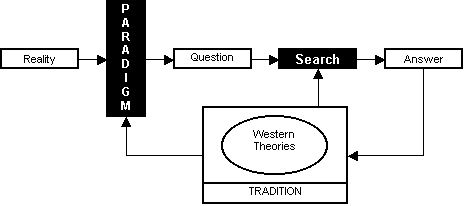
But how about the question of the possibility of the propagation of our cultural colonization? In Philippine studies, we have encountered a similar dilemma. There are a number of theorists, like Virgilio Enriquez in psychology, Prospero Covar in anthropology, and Randolf David in sociology, who vocally opposed Philippine studies importation of theoretical and conceptual tools from the western world, for the same reason that such borrowing would only reinforce our colonial bondage. But I find the position of the anthropologist Raul Pertierra more sober. "Theoretical productions, like other forms of production," he says, "is best improved by building on existing models. As Filipinists we can contribute to a conceptual dialogue by familiarizing ourselves with the reigning paradigms and testing them against our experience of Filipino society."9 This proposal in sociological theory is similar to Florentino Timbreza's exogenous method in philosophy.10 Since western theories and concepts will be deployed as paradigms and research methodologies, they will undergo some reflective tunings to suite the Philippine reality and questions. Thus their output would not be alien anymore, but tinged with the Philippine experience. The output as a product of a Filipino effort can be properly deposited back to our tradition.
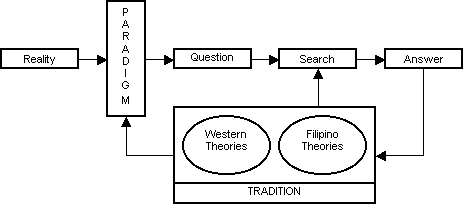
At every turn of the vital circuit from tradition to paradigm to question to search to answer and then back to tradition, a tradition of Filipino theories grows bigger and stronger. This projected growth of a Filipino philosophical tradition side by side with a continuous western borrowing, can sooner or later provide more paradigm and methodologies for succeeding philosophical endeavors. To my mind, the circuit's continued movement is the vital sign that Filipino philosophy is taking root and finally emerging.
| The Culture of Orality |
Though, I do not agree with Quito that Pilosopo Tasyo is a significant obstacle to the development of Filipino philosophy, I agree with her that there is some sort of resistance in Philippine culture against philosophy. Instead of isolating Tasyo as the scapegoat, I would rather explore the texture of Philippine culture to know the underlying reasons for such a resistance.
In her encyclopedia article Pilosopiyang Pilipino, Quito enumerates some of the dominant features of the Filipino Volkgeist: 1) "kongkreto sa halip na abstrakto," 2) "personal sa halip na impersonal, kung kayat kalimitan ay subhetibo at sikolohikal," 3) praktikal at pangkabutihang-asal sa halip ng teoretikal at kognitibo," 4) "sikliko at holistiko sa halip ng pahalang o pahiga," 5) sentripetal, "ginagamit ang sariling pagkatao bilang sentro o pamantayan o sukatan ng pagpapasyang moral," and 6) "maka-diyos kaysa maka-agham."11 There is a rather hotly debated theory in cultural studies proposed by Walter Ong, an American communications theorist and student of Marshall McLuhan. Ong theorized on the differences in the epistemological processes and structure of consciousness between a people belonging to an oral culture and another people belong to a literate culture. An oral culture is a culture that is not dependent on writing and consequently on reading; while a literate culture, which is either a manuscript or a print culture, is a culture that is dependent on writing and reading. Ong argued that based on the presence or absence of textuality, a distinction arises on how a culture thinks. When Ong started to enumerate the characteristic features of the epistemological processes and structure of consciousness of a people belonging to an oral culture, we cannot help but hear the echoes of Quito's list of the dominant features of the Filipino Volkgeist. Graphically I have juxtaposed their thoughts in the chart below.12
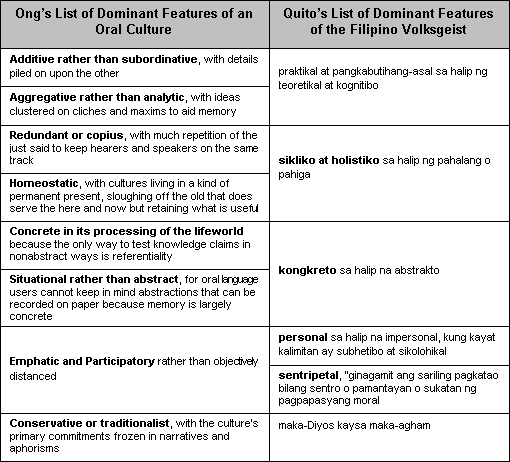
It will be ironic to think that the cultural elements that Quito is trying to scrounged to become the foundation of a Filipino philosophy, are themselves an explanation why there is no Filipino philosophy. If we take Quito's list of face value, then we have to accept as an implication that our national culture is still basically an oral culture. In fact we never had a textual culture. Our literary and religious practices that the Spaniards allegedly systematically destroyed were not necessarily textual. Ong talks about residual orality referring to the "habits of thought and expression tracing back to pre-literate situations or practice, or deriving from the oral as a medium in a given culture, or indicating a reluctance or inability to dissociate the written medium from the spoken."13 Though manuscripts and prints are unquestionable present in our country, culturally speaking, we are still subsisting in a lingering residual orality. If this preliminary diagnosis is correct, this will have an astounding impact to philosophy. One of Ong's influences is a 1963 book entitled Plato written by Eric Havelock.
Havelock identifies concreteness with primary orality, and more abstract thinking with literacy. Havelock maintains that the primary oral cast of mind constituted the chief obstacle to abstract classification of experience, the arrangement of cause and effect, the use of analysis, and scientific rationalism. The primary oral person was involved and committed to a given position on matters, whereas the fully literate person could be detached and look on matters from different points of view. Highly literate persons can examine experience and rearrange it, separate themselves from their experiences instead of just emphatically identifying with them, and stand apart from the object, reconsider it, analyze it, and evaluate it.14 |
In effect, Havelock and Ong are saying that an oral culture cannot support the development of philosophy, only the epistemological processes and structure of consciousness from literate culture can. In fact, Havelock suggests that Plato's hypothetical banishing of the poets from his Republic had been precipitated by the exclusion of orality from the realm of literate philosophy. If indeed in our country there is some sort of a cultural resistance against philosophy, such a resistance is definitely not caused by Pilosopo Tasyo. Rather this resistance is caused by a cultural mind frame of residual orality that is not attuned to philosophizing.
In face of this immense cultural obstacle, I still have to suggest a non-defeatist program of action. Concretely and directly speaking, we are powerless to purge the traces of residual orality from our collective consciousness. But we, as philosophy professors, wield enough power to re-engineer the cultural mindset of our students-the future Filipino philosophers, that is-by immersing them thoroughly and systematically in print and literate culture. This can be done by a systematic and rigorous regimen of reading. The very minimal measure of success for a philosophy program in the Philippines is that must be able to pull its students from a culture of residual orality into a culture of literacy. But there remains for us a moral obligation to pull our culture from residual orality-which is I suspect is one of the root causes of our social and economic underdevelopment-to literacy. Such a sublime moral obligation can be indirectly met when a Filipino philosophy is strong enough, credible enough, legitimate enough to dialogue with the ordinary Filipino's lifeworld. Meanwhile, we have to focus on an epistemological re-engineering of our student's cultural mind set.
| FILIPINO PHILOSOPHY: A CRITIQUE OF QUITO'S PROGNOSIS |
I agree with Quito's prognosis that ultimately the Filipino Volksgeist should fertilize and catalyze the development of an authentically Filipino philosophy. But after knowing the residual orality of such a Volksgeist, I find Quito's prognosis inadequate. Thus, philosophy should not be afraid of borrowing theories and concepts from other nations, as long as such borrowings are done reflectively and as long as such borrowings are applied as paradigms and methodologies. Thomas Aquinas borrowed freely from Arabics, and he contributed greatly to the development of Italian philosophy. Martin Heidegger borrowed from the Danish Soren Kierkegaard, just as Hans-Georg Gadamer borrowed from the Greeks, and both of them contributed much to the development of 20th century German philosophy. There is no reason, therefore, to pontificate that Filipino philosophy must be free from western borrowings.
Finally, I end up this essay with the broad strokes on what Filipino philosophy should be. I believe first and foremost, that it must be a reflection and questioning on and of the Philippine reality creatively using any philosophical, cultural, or sociological paradigms; secondly it is a Filipino'ssearch for answers creatively using again any philosophical, cultural, or sociological paradigms. Third, which I think is the most important, whatever its output may be, it must go back to tradition that will supply the future philosophical endeavors with paradigms and methodologies. To reiterate one point that I made previously, it is at each turn of the vital circuit from tradition to paradigm, to question, to search, to answer, and then back to tradition, that an authentic Filipino philosophy emerges and develops.
| BIBLIOGRAPHY |
Abulad, Romualdo, (1988) "Contemporary filipino philosophy," Karunungan/Sophia, Vol. 5.
Farell, Thomas. (1991) "An Overview of Walter J. Ong's work," Bruce Gronbeck, Thomas Farell and Paul Soukups, eds. Media, Consciousness, and Culture. London: Sage Publications, pp. 25-43.
Foucault, Michel. (1980) "Prison talk." Power knowledge: selected interviews and other writings, Ed. Colin Gordon. London: Harvester Wheatsheaf.
Gadamer, Hans-Georg. (1975) Truth and Method. New York: Seabury Press.
Gronbeck, Bruce. (1991) "Rhetorical studies tradition and Walter J. Ong: Oral-Literacy theories of mediation, culture, and consciousness." Bruce Gronbeck, Thomas Farell and Paul Soukups, eds. Media, Consciousness, and Culture. London: Sage Publications, pp. 5-24.
Habermas, Jurgen. (1996) "Philosophy as stand-in and interpreter." Richard Keamey and Maria Rainwater, eds. The Continental Philosophy Reader. London: Routledge, pp. 238-253.
Heckel, David. (1991) "Francis Bacon's new science: print and transformation of rhetoric." Bruce Gronbeck, Thomas Farell and Paul Soukups, eds. Media, Consciousness, and Culture. London: Sage Publications, pp. 64-76.
Kuhn, Thomas. (1996) The structure of scientific revolutions. Chicago: University of Chicago Press.
Quito, Emerita. Ed. (1993) "Pilosopiyang filipino," Ensayklopidiya ng pilosopiya. Manila: De la Salle University Press, pp. 187-195.
Quito, Emerita. (1982) Teaching and Research of Philiosophy in the Philippines. UNESCO Commissioner Paper.
Quito, Emerita. (1983) The state of philosophy in the Philippines. Manila: De la Salle University Press.